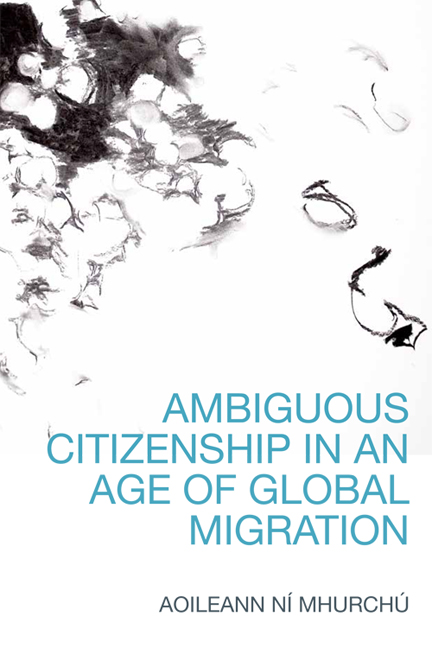Book contents
- Frontmatter
- Contents
- Acknowledgements
- Abbreviations
- Translations
- Introduction
- 1 Exploring the Citizenship Debate: The Sovereign Citizen-Subject
- 2 A Lens: The 2004 Irish Citizenship Referendum
- 3 Trapped in the Citizenship Debate: Sovereign Time and Space
- 4 Interrogating Sovereign Politics: An Alternative Citizen-Subject
- 5 Challenging the Citizenship Debate: Beyond State Sovereign Time and Space
- 6 Traces Rather than Spaces of Citizenship: Retheorising the Politics of Citizenship
- Conclusion
- Bibliography
- Index
4 - Interrogating Sovereign Politics: An Alternative Citizen-Subject
- Frontmatter
- Contents
- Acknowledgements
- Abbreviations
- Translations
- Introduction
- 1 Exploring the Citizenship Debate: The Sovereign Citizen-Subject
- 2 A Lens: The 2004 Irish Citizenship Referendum
- 3 Trapped in the Citizenship Debate: Sovereign Time and Space
- 4 Interrogating Sovereign Politics: An Alternative Citizen-Subject
- 5 Challenging the Citizenship Debate: Beyond State Sovereign Time and Space
- 6 Traces Rather than Spaces of Citizenship: Retheorising the Politics of Citizenship
- Conclusion
- Bibliography
- Index
Summary
Rather than asking ourselves what the sovereign looks like from on high, we should be trying to discover how multiple bodies, forces, energies, matters, desires, thoughts and so on are gradually, progressively, actually and materially constituted as subjects, or as the subject.
Michel FoucaultThis chapter contextualises Balibar's, Isin's and Walker's work within the broader theoretical field of poststructuralism so as to consider how we can think citizenship beyond (understood here as not limited to) sovereign politics. I recognise that the term ‘poststructuralism’ is problematic. The bodies of work considered in this chapter draw on a multitude of approaches, not least deconstruction, psychoanalysis and genealogy. My use of the term is not to invoke a unifying theory, however; rather I use it as a heuristic device to refer to a highly diverse body of social, philosophical and political work by theorists (including Richard K. Ashley, Judith Butler, David Campbell, Roxanne Lynn Doty, Jenny Edkins and Veronique Pin-Fat) who consider the need to imagine alternative forms of political expression to that of modern subjectivity by emphasising the limitations of a state-orientated focus.
In this chapter I explore how these types of work take as their starting point the need to explain the way in which excluded or included selves are produced as ‘individuals’ in terms of the notion of sovereignty (understood as located presence), rather than assuming that sovereign selves always already exist vis-á-vis the state and can necessarily be taken as a given in respect of the question of political subjectivity. This chapter argues that an interrogation of subjectivity as presence in this manner allows for a reassessment of what currently counts as political possibility. It does so by forcing us to revisit (repoliticise) how we have come to know ‘the subject’ and accordingly what we imagine political subjectivity can be.
I discuss how Julia Kristeva's work provides an alternative understanding of political subjectivity as called for by Balibar, Isin and Walker as well as other poststructuralist theorists. This is one no longer based on a metaphysics of presence vis-á-vis the state (sovereignty), but on a metaphysics of process via plurality and hybridity. This is an understanding of human Being based on rupture rather than unity.
- Type
- Chapter
- Information
- Ambiguous Citizenship in an Age of Global Migration , pp. 132 - 162Publisher: Edinburgh University PressPrint publication year: 2014



